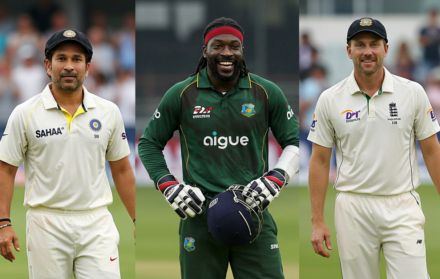
The Role of Cricket in Fostering International Friendships
Cricket, often hailed as a unifying sport, plays a significant role in fostering international friendships. Beyond the boundaries of the pitch, the game has a profound impact on bridging cultures, building connections, and creating lasting relationships across the globe. The rich history of cricket, from its origins to its modern-day influence, has seen the sport evolve into a global phenomenon that brings people together. Whether it’s through friendly matches, international tournaments, or even grassroots initiatives, cricket has become a powerful tool for diplomacy and unity. Understanding the role of cricket in fostering international friendships requires looking at how the sport has shaped and been shaped by diverse cultures.
The inclusivity and diversity of cricket are at the core of its ability to unite people from different backgrounds. Through initiatives that promote inclusivity and diversity, cricket has made strides in breaking down barriers and encouraging participation from all corners of the world. From the early days of the sport, where nations like England and Australia faced off in historic matches, to the modern-day World Cups that attract teams from across the globe, cricket has always been a platform for international camaraderie.
Moreover, cricket’s influence extends beyond just the players. The sport has given rise to numerous documentaries and stories that highlight the personal journeys of players and fans alike, showcasing how cricket fosters friendships that transcend borders. These narratives often reflect the shared values of teamwork, respect, and sportsmanship that are central to cricket, making it a unique medium for building international relationships.
In addition to its cultural impact, cricket also plays a strategic role in international relations. Countries have long used the sport as a diplomatic tool, with matches serving as occasions for leaders to engage in dialogue and cooperation. The importance of cricket in these contexts cannot be overstated, as it provides a common ground for nations to connect and collaborate. For instance, the iconic Oval stadium in England has hosted numerous matches that have become symbolic of peace and friendship between countries.
Cricket’s capacity to foster international friendships is also evident in the way it has been embraced by different cultures around the world. From the bustling streets of India to the serene fields of New Zealand, cricket has woven itself into the fabric of societies, creating a sense of belonging and unity among its followers. This global appeal of cricket is further amplified by its inclusion in events like the World Cup, where nations come together in a celebration of the sport and the friendships it nurtures.
The role of cricket in fostering international friendships is deeply rooted in the sport’s history, its inclusive nature, and its strategic significance. As cricket continues to grow and evolve, it will undoubtedly remain a powerful force in bringing people together and fostering global connections.
Cricket as a Global Connector: Uniting Nations Beyond Borders

Cricket is more than just a sport; it is a global phenomenon that transcends borders, cultures, and languages, uniting people from diverse backgrounds. With its rich history and deep-rooted traditions, cricket has become a symbol of unity and friendship among nations. The sport’s widespread popularity across continents, from the cricketing powerhouses of India, Australia, and England to the emerging teams in Africa and the Caribbean, highlights its unique ability to bring together people from different parts of the world. Through the shared love of the game, cricket fosters international friendships, building bridges of understanding and camaraderie that extend beyond the boundaries of the playing field.
The global appeal of cricket is evident in the way it has brought together nations with vastly different cultures and histories. The sport’s ability to transcend these differences is one of its most powerful attributes. Cricket tournaments, such as the ICC Cricket World Cup and the ICC T20 World Cup, serve as platforms for countries to come together in a spirit of competition and sportsmanship. These events not only showcase the talents of players from around the world but also provide an opportunity for nations to engage with each other on a cultural level. Fans from different countries come together to celebrate the sport, creating a sense of unity and shared passion that transcends national rivalries.
One of the most remarkable aspects of cricket’s role as a global connector is its ability to bring together nations that may have political or historical tensions. The sport offers a neutral ground where countries can interact and build relationships in a positive and constructive manner. Matches between rival nations, such as India and Pakistan, are not only thrilling sporting events but also moments of diplomatic significance. These matches provide an opportunity for the people of both countries to engage with each other, fostering mutual respect and understanding. The spirit of sportsmanship that cricket embodies helps to ease tensions and promote peace, making it a powerful tool for international diplomacy.
Moreover, cricket’s influence extends beyond the professional level, reaching into grassroots communities across the globe. Local cricket clubs, school teams, and amateur leagues bring together people from different backgrounds, creating opportunities for cultural exchange and friendship. The sport’s accessibility and inclusivity mean that anyone, regardless of their nationality or background, can participate and enjoy the game. This widespread participation in cricket helps to build a sense of global community, where people can connect with each other through their shared love of the sport.
In conclusion, cricket plays a vital role in fostering international friendships by bringing together nations and people from diverse backgrounds. Through its global reach and cultural significance, cricket serves as a bridge that connects different parts of the world, promoting unity, understanding, and goodwill. Whether on the international stage or in local communities, cricket continues to be a powerful force for building and strengthening friendships across borders.
Diplomacy on the Pitch: Cricket as a Tool for International Relations
Cricket has long been recognized as a powerful tool for diplomacy, with the sport playing a significant role in shaping international relations. The concept of “cricket diplomacy” refers to the use of the game as a means of fostering dialogue and improving relations between countries. Over the years, cricket has been instrumental in bringing nations together, particularly in times of political tension or conflict. By providing a neutral and non-political platform, cricket allows countries to engage with each other in a positive and constructive manner, helping to build trust, resolve conflicts, and strengthen diplomatic ties.
One of the most notable examples of cricket diplomacy is the relationship between India and Pakistan. These two neighboring countries, which have a long history of political and military tensions, have often used cricket as a means of easing hostilities and opening channels of communication. Cricket matches between India and Pakistan are among the most highly anticipated and watched sporting events in the world, drawing millions of viewers and generating intense excitement. While these matches are fiercely competitive, they also serve as important diplomatic events, providing an opportunity for leaders and officials from both countries to come together and engage in dialogue. The spirit of sportsmanship that cricket embodies helps to create a more conducive environment for diplomatic efforts, making it easier for the two countries to address their differences and work towards peaceful solutions.
Cricket diplomacy is not limited to India and Pakistan; it has been used by other countries as well to improve their international relations. For example, in the 1980s, the Australian government invited the West Indies cricket team to tour South Africa as part of its efforts to challenge the apartheid regime and promote racial equality. The tour was seen as a significant step in the international community’s efforts to isolate South Africa and pressure its government to end apartheid. Similarly, in 2004, the England cricket team’s tour of Zimbabwe sparked widespread debate about the role of sport in international politics, with the UK government using the tour to highlight human rights abuses in Zimbabwe.
In addition to its role in high-level diplomacy, cricket also serves as a tool for cultural diplomacy, helping to promote cross-cultural understanding and exchange. International cricket tours, where teams travel to different countries to play matches, provide an opportunity for players and fans to experience new cultures and build relationships with people from different backgrounds. These tours often include cultural events, community outreach programs, and educational initiatives, all of which contribute to the promotion of mutual respect and understanding between nations.
Furthermore, cricket’s global governing bodies, such as the International Cricket Council (ICC), play an important role in fostering international cooperation and goodwill. The ICC’s efforts to promote the game in emerging cricket nations, such as Afghanistan, Ireland, and Nepal, have helped to build bridges between these countries and the wider cricketing community. By supporting the development of cricket in these regions, the ICC not only helps to grow the sport but also contributes to the strengthening of international friendships and cooperation.
Cricket serves as a powerful tool for diplomacy, playing a significant role in shaping international relations. Through its ability to bring countries together, promote dialogue, and foster cross-cultural understanding, cricket diplomacy helps to build and strengthen friendships between nations. Whether through high-level diplomatic efforts or grassroots cultural exchanges, cricket continues to be an important force for promoting peace and goodwill in the international arena.
Building Bonds Across Cultures: Cricket’s Role in Promoting Cross-Cultural Understanding

Cricket’s ability to foster international friendships is deeply rooted in its role as a medium for cross-cultural understanding. The sport’s global reach and popularity have made it a powerful platform for bringing together people from different cultural backgrounds, enabling them to connect, share experiences, and learn from each other. Through cricket, individuals and communities around the world are able to engage in meaningful cultural exchanges, breaking down barriers and building bonds of friendship that transcend national and cultural differences.
One of the key ways in which cricket promotes cross-cultural understanding is through its diverse and multicultural fan base. Cricket is followed passionately by millions of people across the globe, with fans hailing from a wide range of cultural, ethnic, and linguistic backgrounds. This diversity is particularly evident during international cricket tournaments, where fans from different countries come together to support their teams and celebrate the sport. The shared love of cricket creates a sense of camaraderie and unity among fans, who are able to bond over their common passion despite their cultural differences. This cross-cultural interaction helps to challenge stereotypes, reduce prejudices, and promote a greater understanding and appreciation of different cultures.
Cricket’s role in promoting cross-cultural understanding is also evident in the composition of international cricket teams. Many cricket teams, especially in countries like England, Australia, and South Africa, are made up of players from diverse cultural backgrounds. These multicultural teams not only reflect the diversity of the countries they represent but also serve as a microcosm of global society. By playing together, these players learn to respect and appreciate each other’s cultures, traditions, and perspectives. Their interactions on and off the field demonstrate the power of teamwork and cooperation in overcoming cultural differences and achieving common goals. This sense of unity and mutual respect is then passed on to fans and communities, further reinforcing the message of cross-cultural understanding.
Another important aspect of cricket’s role in promoting cross-cultural understanding is the sport’s accessibility and inclusivity. Cricket is played in countries with a wide range of cultural practices, languages, and religions, making it a truly global sport. The rules of the game are the same regardless of where it is played, providing a common framework that allows people from different cultures to engage with each other on an equal footing. Whether it’s a street cricket match in India, a beach game in the Caribbean, or a formal contest in England, cricket provides a space where people from diverse backgrounds can come together, share their love of the sport, and learn from each other’s experiences.
Cricket’s role in promoting cross-cultural understanding extends beyond the playing field to the broader community. Many cricket organizations and clubs are actively involved in community outreach programs that aim to bring people from different cultural backgrounds together. These programs often include coaching clinics, youth development initiatives, and cultural exchange activities that provide opportunities for participants to learn about each other’s cultures and build lasting friendships. By using cricket as a tool for social inclusion and cohesion, these programs help to create more harmonious and understanding communities.
Cricket plays a crucial role in promoting cross-cultural understanding by bringing together people from diverse backgrounds and providing a platform for meaningful cultural exchanges. Through its global reach, multicultural teams, and community outreach initiatives, cricket fosters a sense of unity and mutual respect that transcends cultural differences. By building bonds of friendship and understanding, cricket contributes to a more inclusive and connected world, where people of all cultures can come together to celebrate their shared love of the sport.
Cricket’s Impact on Youth: Fostering International Friendships Through Sportsmanship
Cricket’s influence on fostering international friendships extends to the younger generation, where the sport plays a significant role in promoting sportsmanship, teamwork, and cultural exchange among youth. As a sport that is deeply rooted in values such as fairness, respect, and integrity, cricket provides an ideal platform for young people to develop important life skills and build friendships that transcend national and cultural boundaries. Through youth cricket programs, international tournaments, and school exchanges, cricket offers young players the opportunity to connect with their peers from around the world, fostering a sense of global citizenship and understanding.
One of the key ways in which cricket fosters international friendships among youth is through international youth cricket tournaments. These events bring together young cricketers from different countries to compete, learn, and interact with each other. Tournaments such as the ICC U19 Cricket World Cup provide a platform for young players to showcase their talents while also engaging in cultural exchange. Off the field, these tournaments often include social events, cultural activities, and team-building exercises that allow players to bond with their peers from other countries. Through these interactions, young cricketers gain a deeper understanding of different cultures, build lasting friendships, and develop a sense of camaraderie that transcends national rivalries.
In addition to international tournaments, many cricket organizations and schools offer exchange programs that provide young players with the opportunity to experience cricket in different cultural contexts. These programs often involve players traveling to another country to train, compete, and live with a host family, allowing them to immerse themselves in a new culture and learn about different ways of life. These experiences help to broaden young players’ horizons, fostering a greater appreciation for cultural diversity and promoting cross-cultural understanding. The friendships formed during these exchanges often last a lifetime, serving as a testament to the power of cricket in bringing people together.
Youth cricket programs also play a crucial role in fostering international friendships by promoting the values of sportsmanship and fair play. From an early age, young cricketers are taught the importance of respecting their opponents, playing by the rules, and displaying good sportsmanship both on and off the field. These values are emphasized through coaching, mentorship, and the example set by professional players. By instilling these principles in young players, cricket helps to create a generation of individuals who value respect, integrity, and teamwork—qualities that are essential for building positive relationships and fostering international friendships.
Moreover, cricket’s inclusivity and accessibility make it a sport that can be enjoyed by young people from all backgrounds, regardless of their nationality, culture, or socioeconomic status. Many cricket organizations and charities work to provide opportunities for underprivileged youth to participate in the sport, ensuring that cricket is accessible to everyone. By bringing together young players from different backgrounds, these programs help to break down barriers and promote social inclusion, creating a more equitable and connected global community.
Cricket’s impact on youth goes beyond the individual level, as the friendships and connections formed through the sport have the potential to influence broader societal attitudes. When young people from different countries and cultures come together to play cricket, they not only build personal friendships but also contribute to a greater understanding and acceptance of diversity within their communities. These positive experiences can help to challenge stereotypes, reduce prejudice, and promote a more inclusive and harmonious society.
Cricket plays a vital role in fostering international friendships among youth by promoting sportsmanship, teamwork, and cultural exchange. Through international tournaments, exchange programs, and inclusive youth cricket initiatives, the sport provides young people with the opportunity to connect with their peers from around the world, build lasting friendships, and develop a sense of global citizenship. By instilling values such as respect, integrity, and inclusivity, cricket helps to create a generation of individuals who are committed to building a more connected and understanding world.
Cricket’s Role in Strengthening Diaspora Communities and Global Ties
Cricket’s ability to foster international friendships is particularly evident in its role within diaspora communities around the world. For many immigrants and expatriates, cricket serves as a cultural anchor, helping them to stay connected to their roots while also integrating into their new communities. The sport’s widespread popularity among diaspora communities not only strengthens ties within these groups but also promotes connections between different cultural communities, fostering a sense of global unity and shared identity.
Diaspora communities, especially those from cricket-loving nations such as India, Pakistan, the Caribbean, and Sri Lanka, have a deep and enduring connection to the sport. For many, cricket is more than just a game—it is a link to their homeland and a way of preserving their cultural heritage. Cricket matches, whether played informally in local parks or watched together on television, serve as important social events where members of the diaspora can come together, celebrate their culture, and build a sense of community. These gatherings provide a space for cultural exchange, where traditions are shared, and friendships are forged, helping to strengthen the bonds within the diaspora.
Cricket also plays a crucial role in promoting integration and fostering friendships between diaspora communities and their host societies. Local cricket clubs, leagues, and tournaments often bring together players from diverse cultural backgrounds, creating opportunities for cross-cultural interaction and understanding. Through cricket, members of the diaspora can connect with people from different backgrounds, share their love of the sport, and contribute to the cultural fabric of their new communities. These interactions help to break down barriers, reduce prejudices, and promote social cohesion, making cricket a powerful tool for building inclusive and harmonious societies.
Moreover, cricket’s role in strengthening diaspora communities extends to the global stage, where the sport serves as a symbol of unity and shared identity. International cricket tournaments, such as the ICC Cricket World Cup, often see strong support from diaspora communities, with fans from different countries coming together to celebrate the sport. These events provide an opportunity for diaspora communities to connect with each other, as well as with fans from their home countries, creating a sense of global solidarity and friendship. The shared passion for cricket transcends national and cultural differences, fostering a sense of belonging and connection that unites people across borders.
Cricket’s influence within diaspora communities is also reflected in the success of players who have roots in these communities. Many international cricketers, such as England’s Eoin Morgan and New Zealand’s Ross Taylor, come from diaspora backgrounds and have gone on to represent their adopted countries at the highest level. These players serve as role models and symbols of the global nature of cricket, demonstrating how the sport can bridge cultural divides and create opportunities for individuals to excel on the world stage. Their success not only inspires young cricketers from diaspora communities but also strengthens the connections between these communities and the wider cricketing world.
In addition to its role in promoting cultural exchange and integration, cricket also plays a significant part in the economic and social development of diaspora communities. Cricket matches and tournaments organized by diaspora groups often serve as fundraising events, supporting charitable causes and community projects both in their host countries and in their countries of origin. These initiatives not only contribute to the well-being of diaspora communities but also help to strengthen ties between these communities and their homelands, fostering a sense of global responsibility and solidarity.
Cricket plays a vital role in strengthening diaspora communities and fostering international friendships. The sport serves as a cultural anchor for diaspora communities, helping them to stay connected to their roots while also promoting integration and social cohesion within their host societies. Through its ability to bring people together, promote cross-cultural understanding, and support community development, cricket contributes to the creation of a more connected and inclusive global society, where people from all backgrounds can come together to celebrate their shared love of the game.





